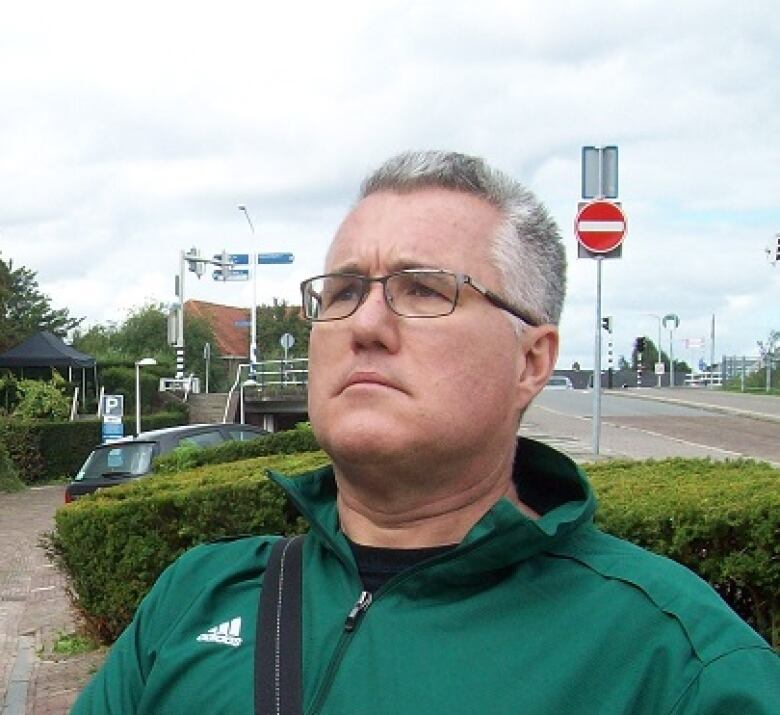Friends, colleagues remember celebrated New Brunswick writer Richard Vaughan
[ad_1]
New Brunswick author, playwright and poet Richard Vaughan is being remembered as a talented writer and a trailblazer for LGBT artists.
Vaughan’s body was discovered on Friday, 10 days after he was reported missing.
Fredericton police say his death is not being treated as suspicious.
His long-time friend, Keith Cole, said he spoke with Vaughan on the phone two days before he went missing.
He said Vaughan was his usual self.
“There were no red flags, no signs of anxiety, no difficulties,” said Cole, in a telephone interview from his home in Toronto.

He said everything seemed to be going well for Vaughan, and no one he’s spoken to noticed anything amiss.
Cole said the literary world has lost “an unbelievably unique voice,” while the gay community has lost a passionate champion.
Cole, a performance artist, met Vaughan in the early 1990s soon after Vaughan moved to Toronto. The two — both gay, artists, adopted, and the same age — travelled in similar circles and were destined to meet at some point, said Cole.
Vaughan approached him on the street car one day and they’ve been friends ever since.
He said he’s still trying to understand Vaughan’s sudden death, “but I’m not there yet.”
Vaughan, who was born in Saint John, lived and worked in Toronto, Berlin, and Montreal before returning to his home province earlier this year to become the writer-in-residence at the University of New Brunswick. He stayed on after the residency finished in May to work on projects delayed by the pandemic.
When Vaughan’s landlord returned to Fredericton because of COVID-19, Vaughan ended up moving in with his friend Nathaniel Moore.
Moore said Vaughan had been suffering from isolation during the pandemic.

He said Vaughan wouldn’t leave his apartment for days at a time, but would then re-emerge “gregarious as usual.”
Moore suspected his friend was missing social interactions with friends in Montreal and Toronto. In addition to that, because of COVID-19 restrictions, he was not able to go out and meet new people in Fredericton.
Friends were important to him, and he spent a lot of time and energy cultivating and maintaining those connections.
Moore said the volume of mail is indicative of the network of friends Vaughan had. He would receive several letters and packages a week — and would send similar amounts.
Moore said he would often see Vaughan pick up little items that he would send in “care packages” to friends.
“It was very important that he maintained those relationships,” said Moore.
“And that’s what was so shocking to me, is that someone who had so highly manicured his friendships with everyone — to just walk away from that.”
Moore said it speaks to the pain that Vaughan must have been experiencing.

He said he and his wife have been receiving numerous calls, primarily from friends in Montreal, Toronto and Berlin.
And on Sunday, a group of about 20 of Vaughan’s friends gathered in Fredericton to reminisce about him, and to discuss how to continue his legacy, and ensure he’s not forgotten.
They hope to set up a foundation and bursary to “acknowledge his contribution and also help foster queer artists who have the luxury of what Richard didn’t have growing up.”
He said Vaughan was a mentor to many and would “nurture them as artists and as queer individuals.”
Cole said Vaughan would often go out of his way when covering the arts scene for several mainstream publications, including the Globe and Mail, to spotlight artists from the LGBT community.
“He was a champion for many, including for New Brunswick,” said Cole.
Moore said Vaughan was a pioneer for queer artists. He said if it wasn’t for the efforts of people like him over the last 30 years, the acceptance of LGBT culture wouldn’t be anywhere near where it is today.
“I’m certainly not saying that the LGBTQ+ community isn’t facing any bigotry or pain or marginalization. They are. But I think things are a lot better than they used to be because of the work that people like Richard did to give queer artists a voice.”

Moore met Vaughan through his literary work in Toronto in 1999, when Vaughan was 34 and he, 24.
He said Vaughan was an extraordinary writer who could “write perfectly about any subject.”
He recently published a chapbook called “Contemporary Art Hates You,” and his other works include screen plays, poetry collections, and novels.
Moore worked with Vaughan on a book of essays, “Compared to Hitler,” in 2013.
Despite his fun-loving and outgoing personality, Moore said he “carried an undercurrent of sadness.”
He said Vaughan had never really gotten over the death of his mother in 2015. He said Vaughan was afraid to go to sleep because he dreamed about his mother.
Friends say he had lingering issues over food, his weight, and his relationship with his father.
But he also had a zest for life and animals and crafting.
“He was quirky. He liked kitsch a lot. He liked junk — cheap costume furniture and flashy cheap clothes, and just weird crap,” said Cole.

He loved painting Easter eggs and Halloween.
“This is his time of year. He loved Halloween,” said Cole.
He also loved telling people’s stories and was “completely, utterly helpful to others,” said Cole. “He never hoarded his knowledge.”
Cole said Vaughan was constantly networking and introducing people he thought should know each other.
Strangely, said Cole, he also had a reputation of being “crusty.”
“But he was so very, very, very approachable,” he said.
While Fredericton friends continue to discuss how to keep his memory alive, Cole said Toronto friends will likely gather in a park for Halloween and remember Vaughan in a manner that he absolutely would have endorsed.
[ad_2]
SOURCE NEWS
